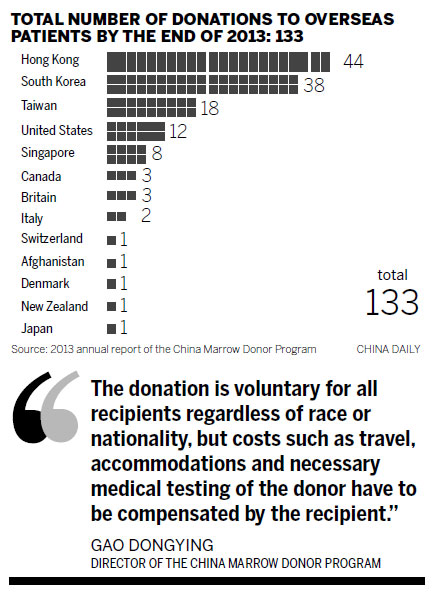Donor plan helps overseas patients
By Shan Juan (China Daily) Updated: 2014-05-12 07:20One hundred forty-four people from overseas have so far received matching stem cells for lifesaving bone marrow transplants from the China Marrow Donor Program under the Red Cross Society of China, according to a program director.
About 1.83 million people, mostly Chinese, were enlisted as stem cell donor volunteers and placed in a data bank by the end of last year, making it the largest program in Asia, said the program's 2013 annual report released on Friday.
Last year, 133 donations were made to overseas patients, and 11 this year.
"Requests from foreign countries to detect a match have continued to rise, particularly after the China program joined the world's marrow donor program in 2012. Now we receive nearly 200 requests from overseas each year," said Gao Dongying, the director of the program.
Foreigners are also welcome to join the China program as donor volunteers, she added.
According to Gao, the program has so far uploaded 680,000 donor volunteer data files to the world program in a bid to facilitate easier and quicker access by foreign patients to potential donors in China.
Most of the overseas recipients - 38 of them - were from South Korea, the report said.
"The donation is voluntary for all recipients regardless of race or nationality, but costs such as travel, accommodations and necessary medical testing of the donor have to be compensated by the recipient," Gao said.
But she also pointed out that China's donor program would first satisfy needs from Chinese citizens.
Nationwide, roughly 1 million Chinese patients need bone marrow transplants each year, but so far, fewer than 800 have secured one through the program, said Liu Weixin, deputy director.
"The cost for the transplant surgery is a big concern, and many can't afford to pay the sum - usually 400,000 yuan ($64,220)," he said.
Each year, the bank receives between 7,000 and 8,000 domestic requests to find a donor match, and at least 80 percent of those find one, he added.
But the majority did not go through with transplantation for various reasons, such as the high medial cost or a change of mind by the prospective donor, he said. The report said that about 20 percent of donor volunteers decline donation after being detected as a match.
In many cases that's due to the pressure from families citing health concerns, Gao said.
"In fact, it's scientifically proven worldwide that the donation of stem cells doesn't harm a donor's health at all," she said, urging more public education to raise awareness.
About 10 percent of the enlisted volunteers are from the medical sector.
So far more than 4,100 patients have landed a match in the data bank, Gao said.
shanjuan@chinadaily.com.cn

- More female officials caught in corruption
- Whampoa veterans recorded with glory
- Police bust 9 terrorist groups in Xinjiang
- Knife-wielding attackers seized in Xinjiang
- New regulation leads to drop in petitioned cases
- Hunan plant shut as probe into lead poisoning begins
- Police boost efforts to combat gambling
- Project offers jobs openings to legal experts
- Experts: Dog meat festival 'illegal'
- Nation looks to upgrade
pipeline networks






